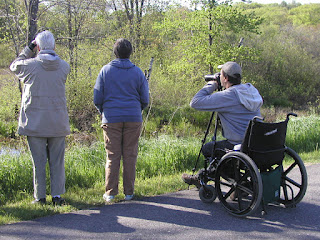 |
| A closed road side is an accessible birding hotspot at a water treatment plant. |
As part of my job with the Massachusetts Department of Conservation and Recreation (DCR) Universal Access Program, I have fond memories of birding with people with disabilities back in 2005-2010 and developing techniques to help more people use optics. Some of these techniques included the use of a monopod with binoculars and starting new birders in places with easy-to-view birds like waterfowl and herons. With changes in technology since then, I'm sure more strategies have emerged for providing the best experience possible for birders with disabilities.
 |
| The ACAB meets up in a parking lot in Turners Falls. |
 |
| The most recent flyer of the Anti-Racist Collective of Avid Birders shows seagulls and pigeons in the city. |
I have not spent enough time yet with the ACAB to know how they might help aspiring birders with disabilities work out adaptations for successful experiences. Here is some additional advice I can offer to anyone who has a disability and is interested in birding:
 |
| Woman uses a scope with angled eyepiece while seated in a wheelchair near the water. |
Certainly find a local group you can bird with - it really helps to go out with experienced birders and there is a lot to be learned in the company of others, especially for identifying bird sounds and faster moving and small birds. Bird clubs exist in every state and your local Audubon chapter can help connect you. Make sure you choose birders that travel at a slower pace and are open to taking the time to help out. Many experienced birders are very focused at their skill level and pace and may not be patient with newcomers in the quest to find species that might be in an area.
Accessible birding locations are key to a good experience. Be aware that weather and seasonal conditions may change accessibility. Rail trails are a good bet, as are many wheelchair accessible locations. Quiet roads and roads closed off to traffic are great choices too, if they are adjacent to wetlands and varying types of habitat. There are many places to choose from on websites and by word of mouth. Massachusetts Audubon has over a dozen All Persons Trails at their sanctuaries around the state.
 |
| Using a monopod to stabilize binoculars. |
If you are looking for help with birding equipment, as with any adaptation process, it helps to communicate both your functionality and what is difficult for you. Birding scopes with angled eyepieces can work more effectively for short or seated people. Binoculars with lower magnification will be better for those who have hand tremors. Binoculars with a wider field of view will help people locate birds easier. Lightweight binoculars will be best for those who experience arm fatigue easily. Some binoculars can be fit to monopods or tripods for more stable viewing - and some even have internal stabilizers to offset hand tremors. Bringing along folding chairs will help those who need to sit in areas where benches are few. Some people may prefer not to wrangle with optics and simply enjoy the birds as they experience them.
Meghadeepa is a proponent of birding from one place and letting the birds come to you. This is a wonderful way to enjoy time outdoors and let nature resume itself around you. Pick a spot that has varying heights of vegetation or changes of habitat, such as where a field meets a forest and a wetland, and you'll encounter a greater variety of birds. Start with birds you know and enjoy them more fully. Get to know their songs. There are plenty of apps now to help with birdsong identification. I recommend Cornell University's All About Birds for more information about each species including their songs and calls. I learn bird song best when I locate the new singer and observe both song and bird together. As you hear new sounds and see birds you don't know yet, you may find yourself becoming a birder - or a more advanced birder - in the quest to solve each mystery!
No comments:
Post a Comment